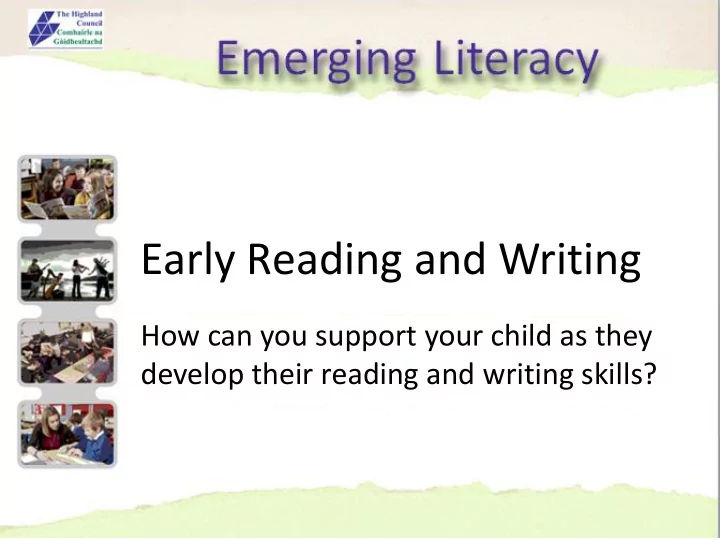

Early Reading and Writing How can you support your child as they develop their reading and writing skills?
Let’s start with an easy task . . .
Was that an easy task? What did you have to be able to do in order to do that? Knowledge Skills Other things?
Phonological Concepts Awareness of Print Oral Fine Motor Language Skills
It is easy if: Many different skills – Co-ordinated – In the right order – Automated
Automated skills Takes practice for skills to become automatic Effortless Does not use “capacity” – Room to think about other things Suppose a child has to think effortfully about: – Holding a pencil – Spacing, or going from left to right – Where one word ends or another begins
Similar for reading?
Forgetting how to read Not as easy as it seems . . . Mo st pe ople c an rea d t h is No rdo est hisg ive ma nypr obl ems Xvxn xf yxx txkx xxt lxttxrs
What was it like at first? &%* &~#£ #$ *ou &~#nk %>ad#ng #£ >a£*
יִֵׁ֒הלֱֺאאָָֽ֤רָֽבתתיֵׁשאֵרֱּבב תֵֵ֦אם ׃ץֶרָ־ָֽאָֽהתֵֵ֦אֱּוםֵׁיַַ֗מָֽשַה
ahtemiholearabtisereb steraahteevmiyamahs
ah te mihole arab tisereb steraah te ev miyamahs
Phonological Oral Awareness Language Fine Motor Concepts Skills of Print
Rhyme Litt ttle le Miss ss Muffe ffet, Sat t on on a tu tuffet fet, Eati ting ng her curds ds and d whey, Alon ong g came e a spider, der, And sat t dow own besid ide e her, Scari aring ng Miss ss Muffe ffet away Phonological Awareness
Playing with your child for ten minutes a day will support the development of your child’s oral language. Oral Language
Fine Motor Skills
www.readwritecount.scot Concepts of Print
Research shows that children whose parents engage with their reading regularly tend to be much better readers than whose parents do not. What do you think has the biggest contribution towards academic achievement? School factors or home factors?
Relative influence of home and school School Home
• The greater the book experience that the primary school child has, the greater the likelihood of literacy success • These sessions are not about teaching your child how to read, but teaching them how to enjoy and engage with reading
Over the next term, your child will be given a new picture book each week to share with you at home. Along with these books, you will be given a “suggested activity” card which will give examples of short tasks that you may wish to use with your child to develop their early literacy skills. Along with this, we will be introducing the children to a more structured phonics programme as they become ready. Children will also be introduced to the Oxford Reading Tree characters and common words in class time. After Christmas, your child will begin taking their own reading book home that will have already been discussed and taught in class during focused reading sessions. Along with these books, you will be given examples of again short tasks that you can do together at home.
With writing, children are being encouraged to build their fine motor skills through a large variety of different play experiences that will help them to develop their pencil grip. At the same time, we are encouraging children to develop their ‘writing voice’ and to be able to orally tell a story. This will include a variety of both real and imaginative contexts. As your child becomes more confident in putting their sounds together to create words (blending) they will begin to create their own texts.
Talking and listening activities are critical at this early stage in their development. We need to be build up their vocabulary so that they can identify these words in their reading and be able to use them in their writing. It is important that we encourage children to analyse/question what they have read or heard so that they can gain a deeper understanding.
Questions?
Recommend
More recommend